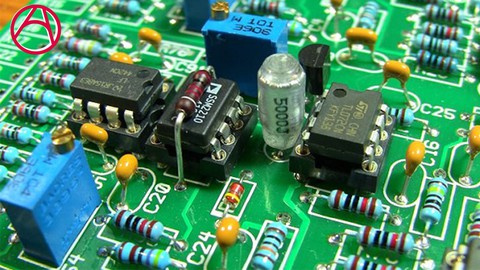
Dc Circuit Analysis (complete)
Dc Circuit Analysis (complete), available at $69.99, has an average rating of 4.05, with 187 lectures, 31 quizzes, based on 169 reviews, and has 1249 subscribers.
You will learn about Students can solve any DC circuit after completing this circuit. Students also gain an understanding of how electric circuit works in general with supporting labs. This course also includes practical information that are required in real life applications. A great stepping stone for the electrical engineering career. This course is ideal for individuals who are People who contemplate a career in electric engineering or related engineering fields such as power and energy systems, systems and control, signal processing and telecommunication. In a clearer way, this course is an excellent opportunity for those who want to learn about basic DC circuits. It is particularly useful for People who contemplate a career in electric engineering or related engineering fields such as power and energy systems, systems and control, signal processing and telecommunication. In a clearer way, this course is an excellent opportunity for those who want to learn about basic DC circuits.
Enroll now: Dc Circuit Analysis (complete)
Summary
Title: Dc Circuit Analysis (complete)
Price: $69.99
Average Rating: 4.05
Number of Lectures: 187
Number of Quizzes: 31
Number of Published Lectures: 187
Number of Published Quizzes: 31
Number of Curriculum Items: 220
Number of Published Curriculum Objects: 220
Number of Practice Tests: 2
Number of Published Practice Tests: 2
Original Price: ₺399.99
Quality Status: approved
Status: Live
What You Will Learn
- Students can solve any DC circuit after completing this circuit.
- Students also gain an understanding of how electric circuit works in general with supporting labs.
- This course also includes practical information that are required in real life applications.
- A great stepping stone for the electrical engineering career.
Who Should Attend
- People who contemplate a career in electric engineering or related engineering fields such as power and energy systems, systems and control, signal processing and telecommunication. In a clearer way, this course is an excellent opportunity for those who want to learn about basic DC circuits.
Target Audiences
- People who contemplate a career in electric engineering or related engineering fields such as power and energy systems, systems and control, signal processing and telecommunication. In a clearer way, this course is an excellent opportunity for those who want to learn about basic DC circuits.
This course teaches you the fundamental steps of Circuit Analysis.After this course, you will be able to solve any DC circuit you encounter. You will also learn basic circuit elements with their basic properties. Additionally, you lean basic laws with lots of theorems that will help you to solve problems. This is the most complete course on Udemy about DC CIRCUIT ANALYSIS. We are here to help you. In the first unit we will begin with basic concepts. After that we will see some laws that allows us to analyze our circuits. Plus, these laws will be applicable to different kinds of analysis, too.After basic laws, we will see Circuit theorems which are really helpful to minimize and simplify our circuits. After learning lots of analysis methods, theorems and laws, we will learn a active element called operational amplifiers. Then we will talk about capacitors and inductors in general as a supplimentary material for next units which are first-order and second-order circuit. A rough overwiev of the curriculum;
1-) Basic Concepts
-Si Units
-Basic Concepts
-Circuit Elements
2-) Basic Laws
-Ohm’s Law
-Nodes,Branches and Loops.
-KCL, KVL
-Series and Parallel Connection of Resistors.
3-) Methods of Analysis
-Nodal Analysis
-Nodal Analysis with Voltage Sources
-Mesh Analysis
-Mesh Analysis with Current Sources
4-) Circuit Theorems
-Linearity
-Superposition
-Source Transformation
-Thevenin’s Theorem
-Norton’s Theorem
-Max Power Transfer
5-) Operational Amplifiers
-Non-Ideal Op Amps
-Ideal Op Amps
-Inverting Op Amps
-Non-Inverting Op Amps
-Summing Op Amps
-Difference Op Amps
-Cascaded Op Amps
6-) Capacitors and Inductors
-Capacitors and General Properties of Them
-Connection of Capacitors
-Inductors and General Properties of Them
-Connection of Inductors
7-) First-Order Circuits
-The Source Free Rc Circuits
-The Source Free Rl Circuits
-Singularity Functions
-The Step Response of An Rc Circuit
-The Step Response of An Rl Circuit
8-)Second-Order Circuits
-Finding the Initial Values
-The Source Free Series Rlc Circuits
-The Source Free Parallel Rlc Circuits
-The Step Response of a Series Rlc Circuit
-The Step Response of a Parallel Rlc Circuit
You can learn more about the curriculum in the introduction video and also you can ask your questions by mailing or messaging.
Hope you enjoy your journey with us.
Welcome to AFTERCLAP.
Course Curriculum
Chapter 1: Introduction To Course
Lecture 1: Introduction
Chapter 2: Basic Concepts
Lecture 1: 1.1-Si Units
Lecture 2: 1.2-Basic Concepts
Lecture 3: Examples of Basic Concepts-1-
Lecture 4: Examples of Basic Concepts-2-
Lecture 5: 1.3-Circuit Elements
Lecture 6: Examples of Circuit Elements
Lecture 7: End of the Unit 1 Problems Level: A
Lecture 8: End of the Unit 1 Problems Level: B
Chapter 3: Basic Laws
Lecture 1: 2.1 Ohm's Law
Lecture 2: Examples of Ohm's Law
Lecture 3: 2.2 Nodes,Branches and Loops
Lecture 4: Examples of Nodes,Branches and Loops.
Lecture 5: 2.3 Kirchoff's Laws
Lecture 6: Examples of Kirchoff's Laws
Lecture 7: 2.4 Series Connection, Voltage Division
Lecture 8: 2.5 Parallel Connection, Current Division
Lecture 9: Examples Of Series,Parallel Connection And Voltage,Current Division
Lecture 10: End Of The Unit 2 Problem : 1
Lecture 11: End Of The Unit 2 Problem : 2
Lecture 12: End Of The Unit 2 Problem : 3
Lecture 13: End Of The Unit 2 Problem : 4
Lecture 14: End Of The Unit 2 Problem : 5
Lecture 15: End Of The Unit 2 Problem : 6
Chapter 4: Methods Of Analysis
Lecture 1: 3.1 Nodal Analysis
Lecture 2: Examples Of Nodal Analysis -1-
Lecture 3: Examples Of Nodal Analysis-2-
Lecture 4: 3.2 Nodal Analysis With Voltage Sources
Lecture 5: Examples Of Nodal Analysis With Voltage Sources-1-
Lecture 6: Examples Of Nodal Analysis With Voltage Sources-2-
Lecture 7: Examples Of Nodal Analysis With Voltage Sources-3-
Lecture 8: 3.3 Mesh Analysis
Lecture 9: Examples Of Mesh Analysis-1-
Lecture 10: Examples Of Mesh Analysis-2-
Lecture 11: Examples Of Mesh Analysis-3-
Lecture 12: Examples Of Mesh Analysis With Current Source-1-
Lecture 13: Examples Of Mesh Analysis With Current Source-2-
Lecture 14: End Of The Unit 3 Problem : 1
Lecture 15: End Of The Unit 3 Problem : 2
Lecture 16: End Of The Unit 3 Problem : 3
Lecture 17: End Of The Unit 3 Problem : 4
Lecture 18: End Of The Unit 3 Problem : 5
Lecture 19: End Of The Unit 3 Problem : 6
Chapter 5: Circuit Theorems
Lecture 1: 4.1 Linearity
Lecture 2: Examples Of Linearity-1-
Lecture 3: Examples Of Linearity-2-
Lecture 4: Examples Of Linearity-3-
Lecture 5: Examples Of Linearity-4-
Lecture 6: 4.2 Superposition
Lecture 7: Examples Of Superposition-1-
Lecture 8: Examples Of Superposition-2-
Lecture 9: Examples Of Superposition-3-
Lecture 10: Examples Of Superposition-4-
Lecture 11: Examples Of Superposition-5-
Lecture 12: 4.3 Source Transformation
Lecture 13: Examples Of Source Transformation-1-
Lecture 14: Examples Of Source Transformation-2-
Lecture 15: Examples Of Source Transformation-3-
Lecture 16: Examples Of Source Transformation-4-
Lecture 17: 4.4 Thevenin Theorem
Lecture 18: Examples Of Thevenin Theorem-1-
Lecture 19: Examples Of Thevenin Theorem-2-
Lecture 20: Examples Of Thevenin Theorem-3-
Lecture 21: 4.5 Norton Theorem
Lecture 22: Examples Of Norton Theorem-1-
Lecture 23: Examples Of Norton Theorem–2-
Lecture 24: Examples Of Norton Theorem-3-
Lecture 25: Examples Of Norton Theorem-4-
Lecture 26: 4.6 Maximum Power Transfer
Lecture 27: Examples Of Maximum Power Transfer-1-
Lecture 28: Examples Of Maximum Power Transfer-2-
Lecture 29: End Of The Unit 4 Problems : 1
Lecture 30: End Of The Unit 4 Problems : 2
Lecture 31: End Of The Unit 4 Problems : 3
Instructors
-
AFTERCLAP TEAM
Community -
Afterclap Academy
Instructor
Rating Distribution
- 1 stars: 2 votes
- 2 stars: 3 votes
- 3 stars: 14 votes
- 4 stars: 36 votes
- 5 stars: 114 votes
Frequently Asked Questions
How long do I have access to the course materials?
You can view and review the lecture materials indefinitely, like an on-demand channel.
Can I take my courses with me wherever I go?
Definitely! If you have an internet connection, courses on Udemy are available on any device at any time. If you don’t have an internet connection, some instructors also let their students download course lectures. That’s up to the instructor though, so make sure you get on their good side!
You may also like
- Top 10 Mobile App Development Courses to Learn in December 2024
- Top 10 Graphic Design Courses to Learn in December 2024
- Top 10 Videography Courses to Learn in December 2024
- Top 10 Photography Courses to Learn in December 2024
- Top 10 Language Learning Courses to Learn in December 2024
- Top 10 Product Management Courses to Learn in December 2024
- Top 10 Investing Courses to Learn in December 2024
- Top 10 Personal Finance Courses to Learn in December 2024
- Top 10 Health And Wellness Courses to Learn in December 2024
- Top 10 Chatgpt And Ai Tools Courses to Learn in December 2024
- Top 10 Virtual Reality Courses to Learn in December 2024
- Top 10 Augmented Reality Courses to Learn in December 2024
- Top 10 Blockchain Development Courses to Learn in December 2024
- Top 10 Unity Game Development Courses to Learn in December 2024
- Top 10 Artificial Intelligence Courses to Learn in December 2024
- Top 10 Flutter Development Courses to Learn in December 2024
- Top 10 Docker Kubernetes Courses to Learn in December 2024
- Top 10 Business Analytics Courses to Learn in December 2024
- Top 10 Excel Vba Courses to Learn in December 2024
- Top 10 Devops Courses to Learn in December 2024























